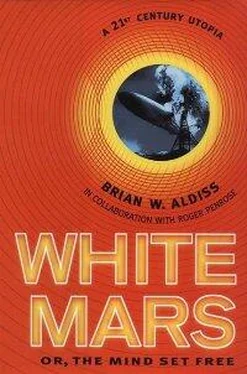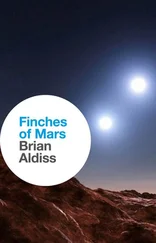Brian Aldiss - White Mars
Здесь есть возможность читать онлайн «Brian Aldiss - White Mars» весь текст электронной книги совершенно бесплатно (целиком полную версию без сокращений). В некоторых случаях можно слушать аудио, скачать через торрент в формате fb2 и присутствует краткое содержание. Год выпуска: 1999, ISBN: 1999, Издательство: Little, Brown UK, Жанр: Фантастика и фэнтези, на английском языке. Описание произведения, (предисловие) а так же отзывы посетителей доступны на портале библиотеки ЛибКат.
- Название:White Mars
- Автор:
- Издательство:Little, Brown UK
- Жанр:
- Год:1999
- ISBN:0-316-85243-0
- Рейтинг книги:5 / 5. Голосов: 1
-
Избранное:Добавить в избранное
- Отзывы:
-
Ваша оценка:
- 100
- 1
- 2
- 3
- 4
- 5
White Mars: краткое содержание, описание и аннотация
Предлагаем к чтению аннотацию, описание, краткое содержание или предисловие (зависит от того, что написал сам автор книги «White Mars»). Если вы не нашли необходимую информацию о книге — напишите в комментариях, мы постараемся отыскать её.
White Mars — читать онлайн бесплатно полную книгу (весь текст) целиком
Ниже представлен текст книги, разбитый по страницам. Система сохранения места последней прочитанной страницы, позволяет с удобством читать онлайн бесплатно книгу «White Mars», без необходимости каждый раз заново искать на чём Вы остановились. Поставьте закладку, и сможете в любой момент перейти на страницу, на которой закончили чтение.
Интервал:
Закладка:
Old hierarchies were dissolving: even as Tom had predicted, the human mind was becoming free.
At all this great activity I looked in amazement. To repair the damage done to my body I studied pranayama, becoming more aware of Eastern influence in our society. I wondered if this was really the case, or did I, with my Eastern inheritance, merely wish it to be so?
I asked this question of Tom. Perhaps we had grown closer over the past year. Tom said, “I cannot answer your question today. Let’s try tomorrow.”
On the morrow, when we met with Belle Rivers again for another discussion of what education should consist, he looked amused and said, “Has your question been answered overnight?”
Playing along with this zen approach, I replied, “No religion has a monopoly on wisdom.”
At this he yawned and pretended to be bored. He said he believed, though without sure foundation, that there had been a time when the West, the little West which then called itself Christendom, had been a home of mysticism. Come the Renaissance, people forgot constant prayer, loving instead the riches and excitements of the world about them. They had given themselves up to the worldly things and even neglected to love, first others, then themselves. Now it was possible that in our reduced circumstances we might learn to love ourselves again with a renewed mysticism.
“And love God?” I asked.
“God is the great cul de sac in the sky.”
“Only to those with spiritual myopia,” Belle said, with a trace of irritation.
I couldn’t resist teasing Tom—a tease in which there was some flattery—telling him he was the new mystic, come to guide us.
“Don’t get that notion in your head, my dear Cang Hai, or try to put it in mine. I cannot guide since I don’t know where we are going.”
But he offered me, chuckling, a story of a holy man who finally gave up calling on Allah because Allah never spoke in return, never said to the man, “Here am I.” Whereupon a prophet appeared to the holy man in a vision, hot foot from Allah. What the prophet reported Allah as saying was this: “Was it not I who summoned thee to my service? Was it not I who engaged thee with my name? Was not thy call of ‘Allah!’ my ‘Here am I’?”
I said I was pleased that Tom had a mystical as well as a practical side, to which he answered that he clung to a fragment of mysticism, hoping to be practical. That practicality might permit our grandchildren to espouse the contentment of real mysticism.
I thought about this for a long time. It seemed to me that he denied belief in God, and yet clung to a shred of it.
Tom admitted it might be so, since we were all full of contradictions. But whether or not there was a god outside, there was a god within us; in consequence he believed in the power of solitary prayer, as a clarifier, a magnifying glass, for the mind.
“At least, so I believe today,” he said teasingly. “My dear Cang Hai, we all have two hemispheres to our brains. Can we not carry two different tunes at the same time? Do you not wish to be silent in order to listen to them?”
While we were talking in this abstract fashion, our friends were making love and more children were being conceived. Too many would threaten the precarious balance of our existence. To find Tom planning for two generations ahead made me impatient.
“We must deal with our immediate difficulties first, not add to them. This random procreation threatens our very existence. Why do you not issue a caution against unbridled sexuality?”
“For several good reasons, Cang Hai,” he said. “The foremost of which is that any such caution would be useless. Besides, if I, a DOP, issued it, it would be widely—and maybe rightly—regarded as an edict flung across the generation gap.”
I laughed—“Don’t be afraid of that. You are older, you know better! Don’t you?”—for I saw his hesitation.
“No, to be honest I don’t know better. Sexual temptation does not necessarily fade with age. It’s merely that the ease with which one can give in to it disappears!” He laughed. “You see, our generations have become too preoccupied with sexuality. You know what Barcunda said.
“Our relationships with natural things withered and died in the streets. We no longer tend our gardens—or sleep under the stars, unless we are down-and-outs. We think stale city thoughts, removed from nature. All we have to relate to is each other. That’s unnatural; we should be responding to agencies outside ourselves. The quest for ever more sexual satisfaction runs against true contentment. Against love, joy and peace, and the ability to help others.”
“Ah, those ‘agencies outside ourselves’ … Yes…”
We sat silently for a while.
At last I said, “It is sometimes difficult for us to speak our minds. Perhaps it’s because I have reverence for you that I agree with what you say. Yet not only that… I have not found great pleasure in sex, with either men or women. Is that something lacking in me? I seem to have no—warmth? I love, but only platonically, I’m ashamed to admit.”
Tom put his large hand on mine.
“You need feel no shame. We are brought up in a culture where those who seek solitude or chastity are made to think of themselves as unwell—fit subjects for new sciences like psychurgy and mentascopism—almost beyond the pale of society. It was not always so and it will not be so again. Once, men who sought solitude were revered. These matters are not necessarily genetic but a question of upbringing.”
After a pause, he said, “And your upbringing, Cang Hai. Where are you in Kissorian’s scheme of things—a later-born, I’d guess?”
“No, Tom, dear. I am a dupe.” Looking searchingly at him, I was surprised he did not immediately understand.
“A dupe?”
“A clone, to use the old-fashioned term. I know there’s a prejudice against dupes, but since our difference doesn’t show externally we are not persecuted. My counterpart lives in China, in Chengdu. We are sometimes in psychic touch with one another. But I do not believe that case affects my attitude to sexuality. As a matter of fact, I spend much time in communication with those archetypes of which you say someone spoke in the debate. I believe I am in touch with myself, though I’m vexed by mysterious inner promptings. Those promptings brought me to Mars—and to you.”
“I am grateful, then, for those inner promptings,” he said, giving me a grave smile. “So you are that rare creature, not born of direct sexual union…”
I told him I knew of at least a dozen other dupes with us on Mars.
With a sudden intuition, Tom asked if Kathi was also a dupe. I said it was not so; was he interested in her?
He chose to ignore this. Dropping his gaze, he said, “My destiny seems to be as an organiser. I’m doomed to be a talker, while in my heart of hearts, that remote place, I believe silence to be a greater thing.”
“But not the silence, surely, that has prevailed on Mars for centuries?”
His face took on a ponderous expression I had observed previously. He stared down at the floor. “That’s true. That’s a dead silence. We shall have to cure it in the end … Life has to be the enemy of such tomb-like silence.”
Smiling apologetically, he dismissed me.
I regretted not telling him that Kathi did not find Mars’s silence a dead silence; she claimed that it could be heard if only we attuned ourselves to it. But she and I had no authority. After all, Tom was a famous and successful man, and who was I? Although I relished his attention, and his kindly looks, he had said nothing about his personal history since the evening on Spider Plant when he had spoken of his first love. Did he regret confiding in me? Could I bear any more of the same?
Читать дальшеИнтервал:
Закладка:
Похожие книги на «White Mars»
Представляем Вашему вниманию похожие книги на «White Mars» списком для выбора. Мы отобрали схожую по названию и смыслу литературу в надежде предоставить читателям больше вариантов отыскать новые, интересные, ещё непрочитанные произведения.
Обсуждение, отзывы о книге «White Mars» и просто собственные мнения читателей. Оставьте ваши комментарии, напишите, что Вы думаете о произведении, его смысле или главных героях. Укажите что конкретно понравилось, а что нет, и почему Вы так считаете.










